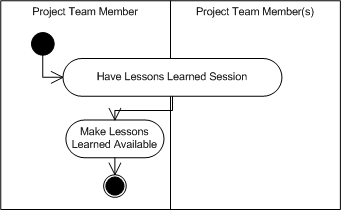| Problem | In a project many experiences are gained but those are not systematically collected and understood. |
| Initial Context | Ongoing project or nearly closed project. At least some intermediate outcome is achieved. |
| Roles | Project team members as a team of people working together. |
| Forces | Most of the experience in a project business organization is gained in projects. To learn from the experience requires a translation from experience into knowledge, which takes a certain amount of intention (Dixon, 2000, p. 18). Thus, to know what has been learned and to make it possible later to share the knowledge, a project must be carefully analyzed. This also helps the project team members to understand what they have learned and to share this in their project team.
A team needs to explore the relationships between action and outcome in a project. The discussion related to this is what translates their experience into knowledge. A result of this exploring is the common knowledge in the team. Constructing team knowledge does not happen automatically. (Dixon, 2000, pp. 18-19). |
| Solution |
|
| Resulting Context | A project systematically analyzed from the perspective of lessons learned. Organizational process for packaging and sharing knowledge initiated. |
| Instances | Have lessons learned session at least for each relevant milestone. The meeting can be part of the milestone review or a separate meeting. A final lessons learned session should be taken during the project closure to summarize everything and (latest at this point) to initiate the organizational sharing of lessons learned (see: Utilized Experience Base, KSP27).
In addition to project teams, also other teams in an organization could think about having systematic lessons learned sessions. One potential pitfall is that the lessons learned sessions are taken, but those start to be just some quick look through of measuring data and not having a real discussion that is required to translate the experience into knowledge. |
| Process Connection | Project management: milestones review and project closure meeting. |
